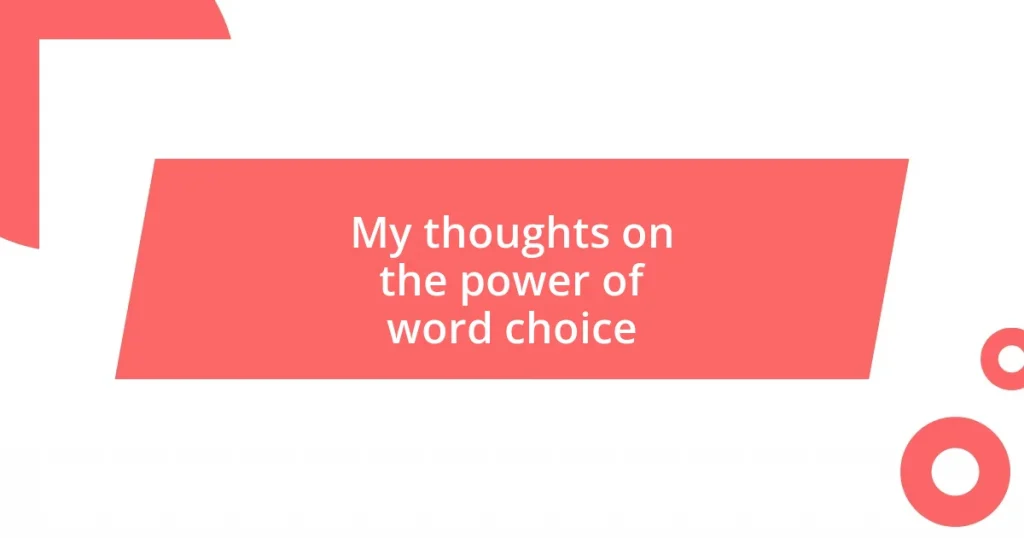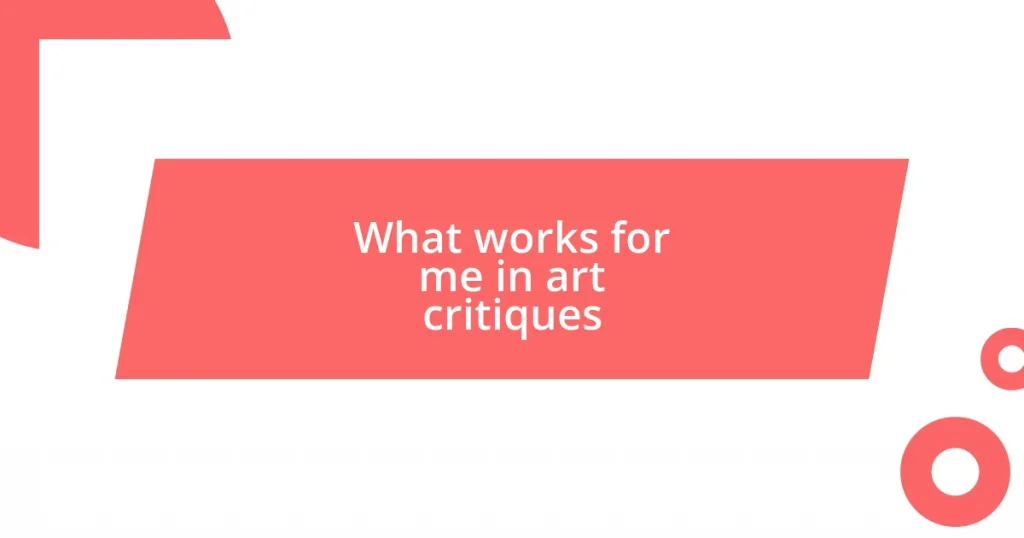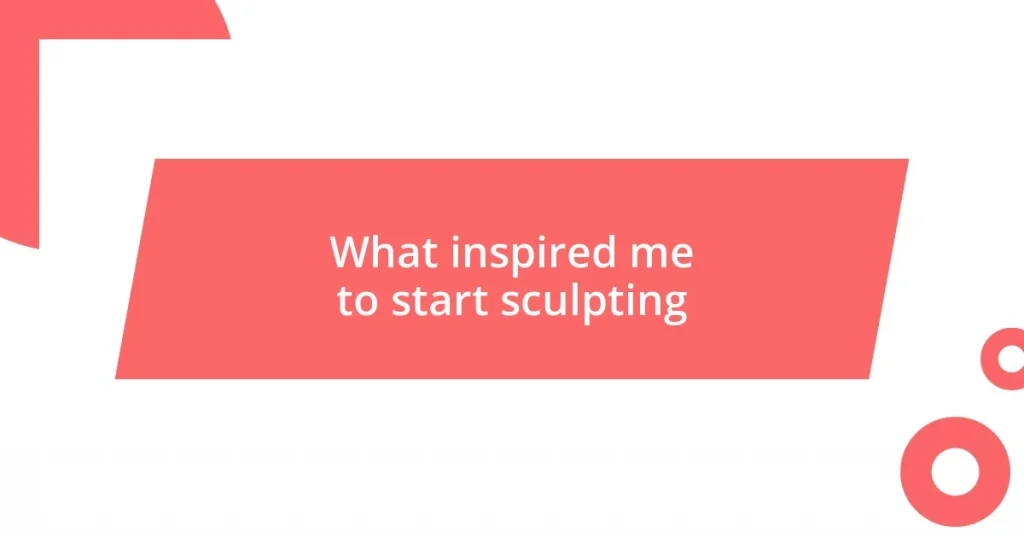Key takeaways:
- Words have the power to transform perceptions, with positive language inspiring action and growth, while negative wording can invoke fear and hopelessness.
- Mindful word choice and phrasing can significantly deepen relationships and enhance communication effectiveness.
- Building a powerful vocabulary involves understanding emotional impact, practicing word choice in real-life scenarios, and avoiding jargon to ensure clarity and connection.
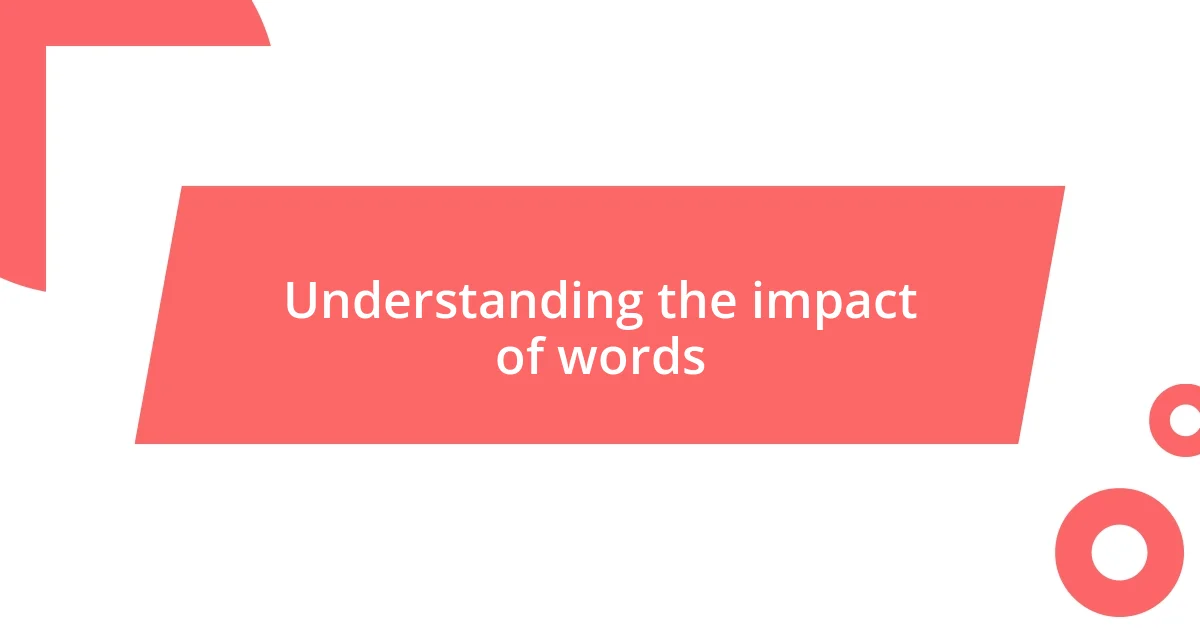
Understanding the impact of words
Words can be incredibly powerful. I vividly remember a moment when a simple “thank you” turned my entire day around. That feeling of being appreciated—it’s amazing how three little words can evoke gratitude and connection. Have you ever experienced something similar?
Consider how the choice of words in a conversation can shape perceptions. For instance, I often think about how the word “failure” can elicit shame while “learning opportunity” promotes growth. It’s fascinating to see how language can influence our mindset and behavior. Isn’t it interesting to reflect on how the same idea can be communicated in two different ways?
I once faced a difficult situation at work where words chosen by my manager either encouraged me or made me feel defeated. I realized that the phrases we use can uplift others or tear them down. Words have the power to unite or divide, inspire, or discourage. How do you choose to wield that power in your everyday life?
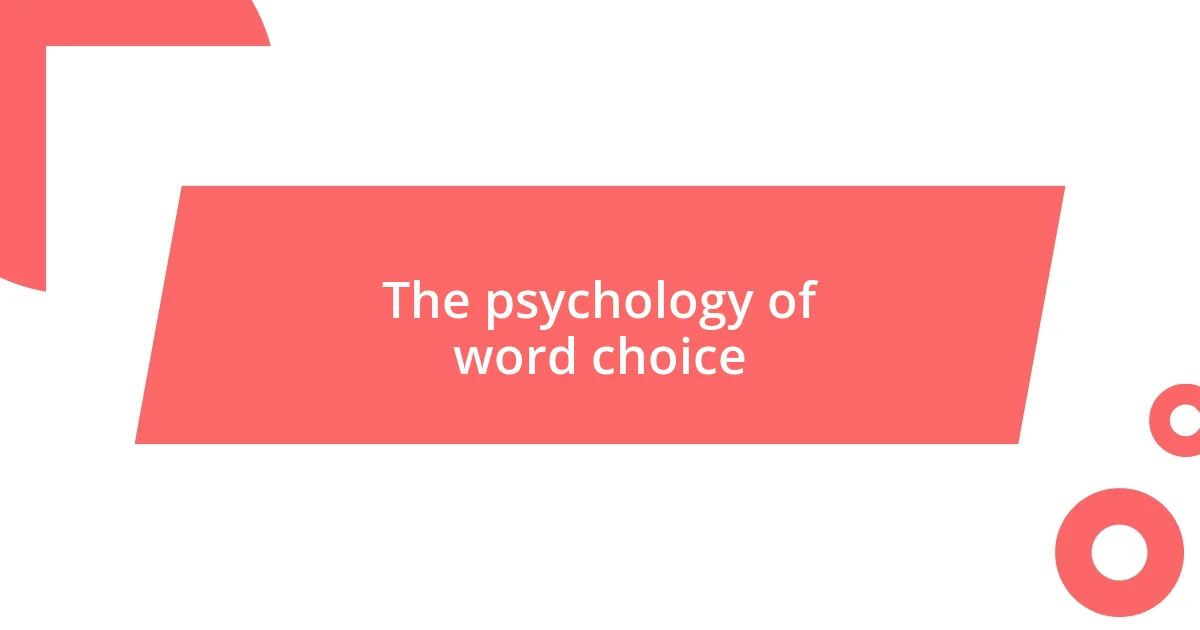
The psychology of word choice
Words aren’t just vessels of communication; they’re emotional triggers that can leave lasting impressions. I remember receiving the feedback, “You did a good job,” versus “You nailed it!” The difference felt like night and day. The latter sparked a rush of pride, while the former, though nice, didn’t ignite the same fire in me. It’s incredible how slight shifts in phrasing can alter our emotional responses.
Language also shapes our reality by framing situations in distinct lights. For example, consider the phrases “problems” versus “challenges.” My experience has taught me that labeling an obstacle as a challenge instills a sense of excitement and possibility instead of dread and defeat. It’s almost like wearing a new pair of glasses; suddenly, the world appears brighter and more full of opportunities.
Navigating conversations with an awareness of word choice can dramatically influence our interactions. For instance, when I told a close friend, “I appreciate you” instead of “I like you,” the response was electric. It highlighted how intentional word choices can deepen relationships and convey authenticity. Such moments drive home the importance of being mindful about our language, as they teach us how to connect on a deeper level.
| Positive Word Choice | Negative Word Choice |
|---|---|
| “Opportunity” | “Problem” |
| “Growth” | “Failure” |
| “Collaboration” | “Conflict” |
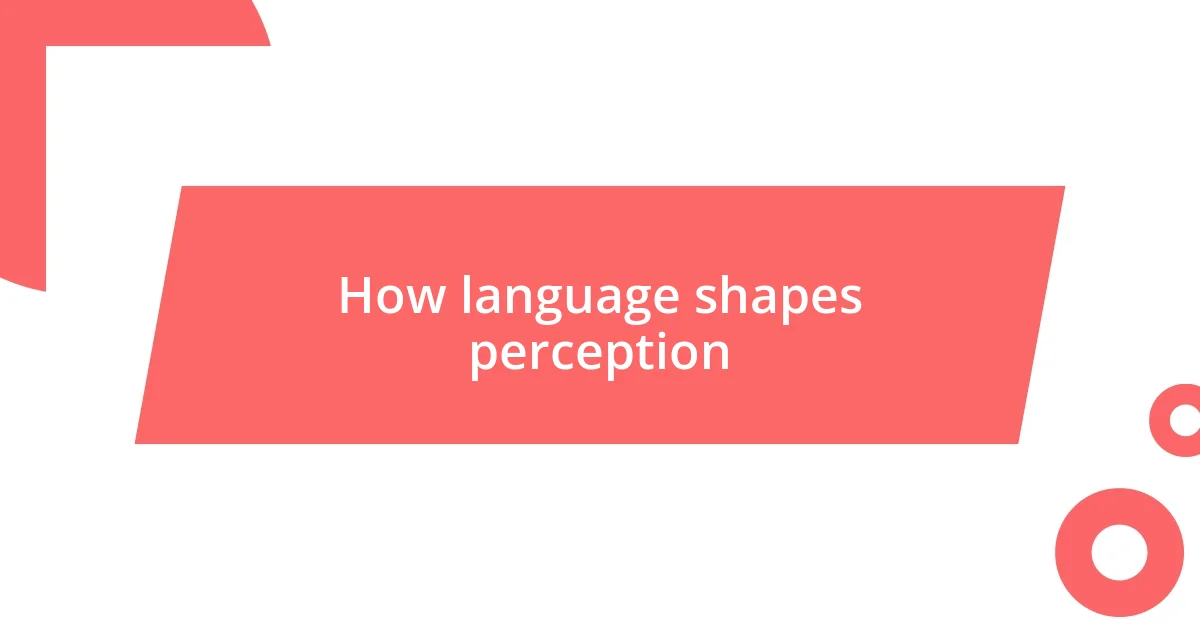
How language shapes perception
Language is more than just a means of communication; it profoundly influences how we perceive and interpret the world around us. I recall a conversation with a colleague where I referenced a “dead end” in a project. The atmosphere instantly shifted—everyone felt the weight of negativity. But when I later referred to the same situation as a “learning curve,” the energy transformed. I could see my teammates’ faces light up, as if a door to a new path opened before them. It’s remarkable how simply reframing words can alter not just the mood but the entire outlook on a situation.
- Positive phrases can inspire action and creativity.
- Negative wording can invoke fear or hopelessness.
- The context in which we use language matters greatly.
- Awareness of our word choices fosters more meaningful connections.
- Language can empower or disempower us in everyday situations.
Reflecting on these experiences, I realize that the words I choose hold immense power. Whether in a casual chat or a formal meeting, I notice the weight of each word. I’m always mindful when I tell a friend how much they mean to me—switching from “I care about you” to “You’re invaluable in my life” feels like giving them a heartfelt gift. This attention to language not only deepens understanding but also enhances the bonds we share. When we consciously choose our words, we shape not just perceptions but relationships, creating a ripple effect that resonates far beyond the conversation itself.
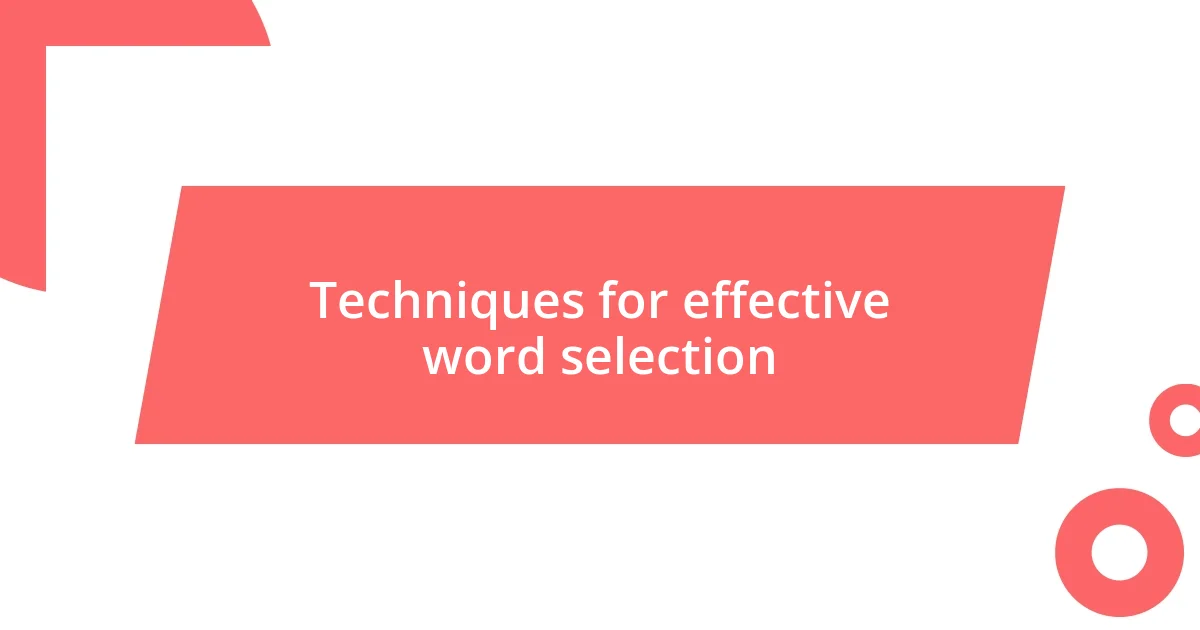
Techniques for effective word selection
When it comes to effective word selection, one technique I often rely on is the practice of visualization. I like to imagine the scenario I’m writing about or discussing. For instance, if I’m working on a project proposal, I visualize the outcome I want to achieve. In doing so, I select words that create a vivid image for my audience. Does “we will attempt” capture your attention, or does “we will achieve” inspire confidence? The difference is subtle yet significant.
Another valuable technique is to use a thesaurus thoughtfully. I remember during a presentation, substituting “difficult” with “challenging” not only softened the message but also made our goal seem attainable. It taught me that a simple word swap can dramatically shift the tone and outcome of my communication. However, I’ve learned to ensure that the synonyms I choose accurately convey the intent behind my original thought; otherwise, they may confuse my audience instead of clarifying my message.
Listening to feedback is key in refining word choice. I often ask colleagues or friends how my phrasing impacts them. Recently, I experimented with saying “I trust your judgment” versus “I believe in you.” The feedback I received was enlightening, as the latter resonated more deeply with my friend, fostering even greater trust. This experience underscored the importance of not just choosing the right words, but also being receptive to how they are received. How often do we pause to consider the impact our words have on others? Engaging in this dialogue helps craft more meaningful conversations.
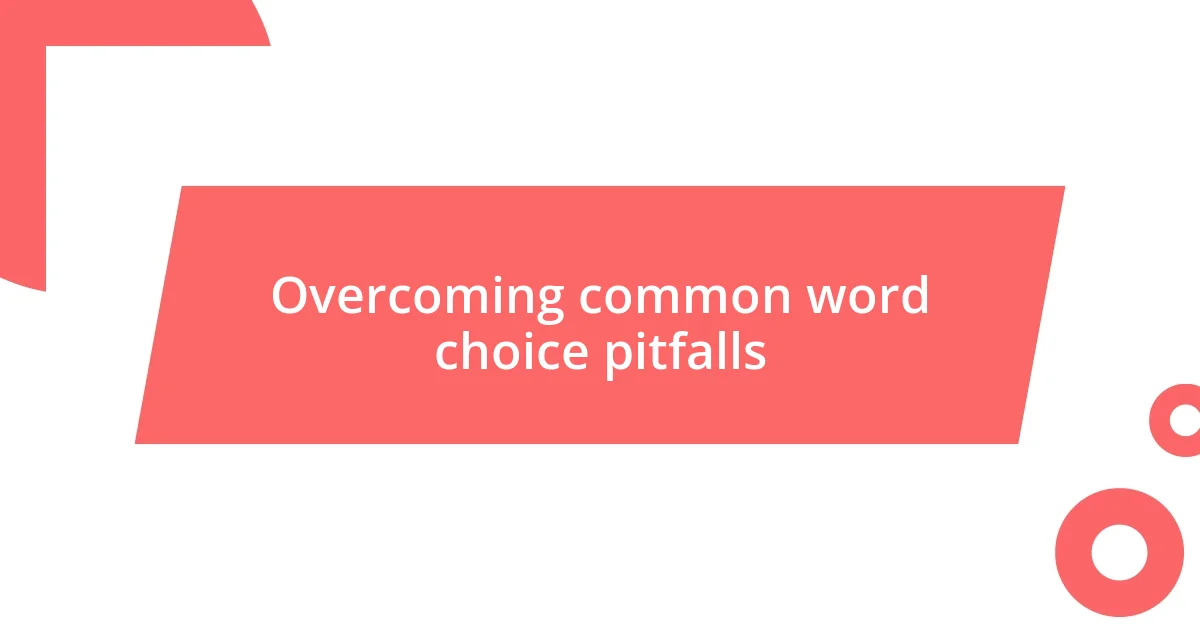
Overcoming common word choice pitfalls
One common pitfall I’ve faced in word choice is relying too heavily on jargon or technical terms, especially when I assume everyone is on the same page. There was a time I was leading a workshop and used terms like “ROI” and “synergy” without really checking if my audience understood them. Didn’t I realize that what felt empowering to me could leave others feeling confused or excluded? The moment I shifted to more straightforward language, I saw the participants lean in, engaged and eager to contribute. It reinforced the lesson that clarity fosters connection.
Another challenge is using negative language, which I’ve often observed can dampen enthusiasm. I remember giving feedback on a project where I pointed out flaws but ended up leading with an overabundance of “don’t” statements. The team felt discouraged, and I felt regretful afterward. By changing my approach to more encouraging phrases, like “Let’s explore ways to improve this,” the mood transformed instantly. It’s a vivid reminder that language can either uplift or deflate; so why not choose to inspire?
I’ve also found that overthinking word choice can lead to unnecessary complexity, making my communication seem less genuine. I distinctly recall a time when I tried to sound more sophisticated in an email, packing it with elaborate phrases. I received a response that was polite but detached. When I took a step back and opted for a simpler, more conversational tone, the reply flowed with warmth and engagement. Isn’t it interesting how authenticity resonates more powerfully than formality? It’s crucial to embrace the idea that sincerity often speaks louder than sophistication.
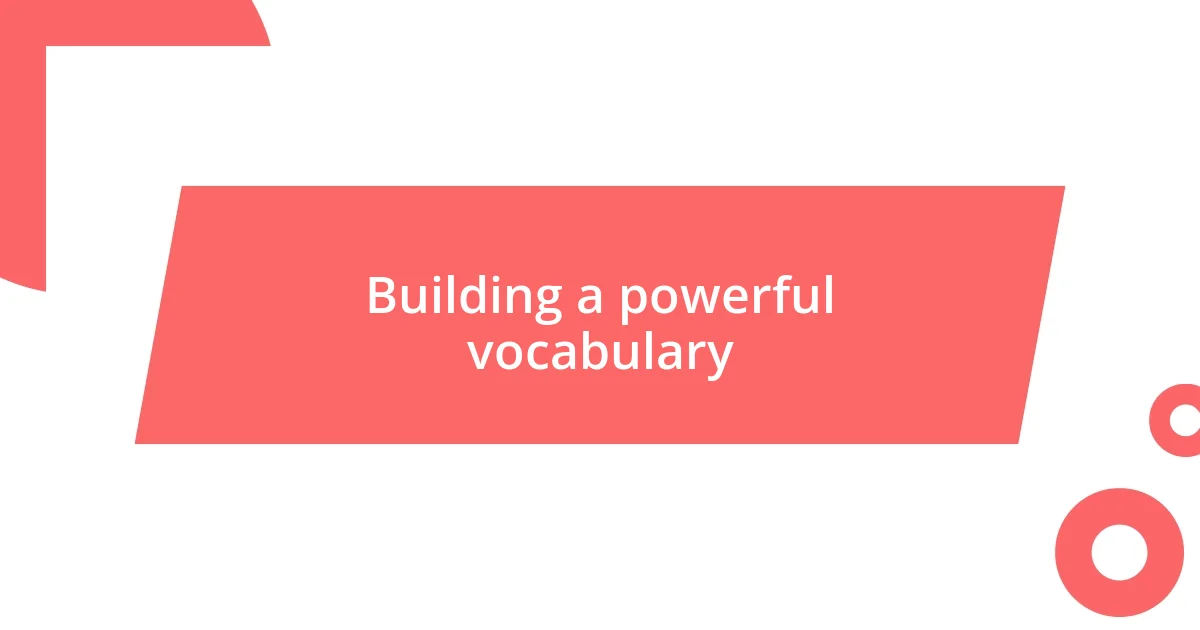
Building a powerful vocabulary
Building a powerful vocabulary isn’t just about memorizing words; it’s about connecting meaningfully with others. I remember sitting down at a coffee shop, brainstorming for an article, when the phrase “make it happen” popped into my mind. Suddenly, it struck me how much more evocative it was than simply saying “do it.” It reminded me that every word carries its own weight and emotional impact, shaping how we inspire action in others. Have you ever felt the difference that a single word can make?
Investing time in reading diverse materials has also expanded my vocabulary profoundly. I often find myself immersed in different genres, from poetry to scientific articles. Each new piece exposes me to fresh expressions and ideas. It’s like opening a door to a room full of treasures. I recall reading a beautifully crafted novel and stumbling across the word “sonder,” which refers to the realization that each passerby has a life as vivid and complex as your own. I felt compelled to incorporate that word into my daily conversations. Sharing such unique words can spark richer discussions and deeper connections—don’t you think?
Finally, practicing word choice in real-life scenarios is an invaluable exercise. I made a point to integrate new words into casual exchanges, like telling a friend they were “exemplary” rather than just “good.” It wasn’t just about the word itself, but how it transformed my expression and the reaction it elicited. The smile on their face—the way they stood a little taller—made me appreciate the significance of uplifting language. It’s empowering to realize that the words we choose can uplift those around us. How often do we consider this opportunity to encourage and elevate someone’s day?










